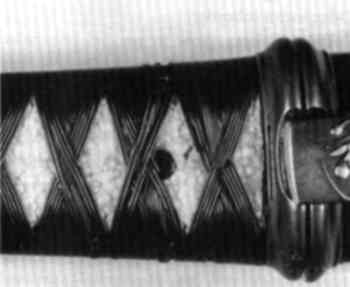BALEEN IN MUSEUM COLLECTIONS: ITS SOURCES, USES, AND IDENTIFICATIONJULIE A. LAUFFENBURGER
1 INTRODUCTIONThis investigation of baleen was initiated during the examination and treatment of two 19th-century Japanese swords in the collection of the Walters Art Gallery, Baltimore, Maryland, during the spring of 1991. A number of sword hilts displayed in Hackerman House, the Walters Art Gallery Museum of Asian Art, were wrapped with a thin, black plastic-like material of unknown origin (fig. 1). In several cases the wrappings were in very bad condition with extensive losses, and they required conservation treatment. First, it was important to identify all materials involved so that subsequent treatment, storage, and exhibit would be compatible. One likely material was whale baleen.
The use of baleen to wrap sword hilts was brought to our attention by a local Japanese sword enthusiast. This information prompted the ensuing research into the production and use of baleen on Japanese swords, which are world renowned for their superior quality and craftsmanship. The art of the Japanese sword includes not only the blades themselves but the scabbards, hilts, tsuba (swordguards), and other associated ornamental metalwork. The materials and techniques of the craft have been written about at length; hilt wrappings, although not the focus of much written information, are mentioned in several texts on Japanese swords. The investigation soon expanded to include Inuit, European, and early American uses of baleen. Not surprisingly, very little information on baleen was available in the conservation literature, yet it soon became apparent that baleen was commonly found on many museum artifacts. |
